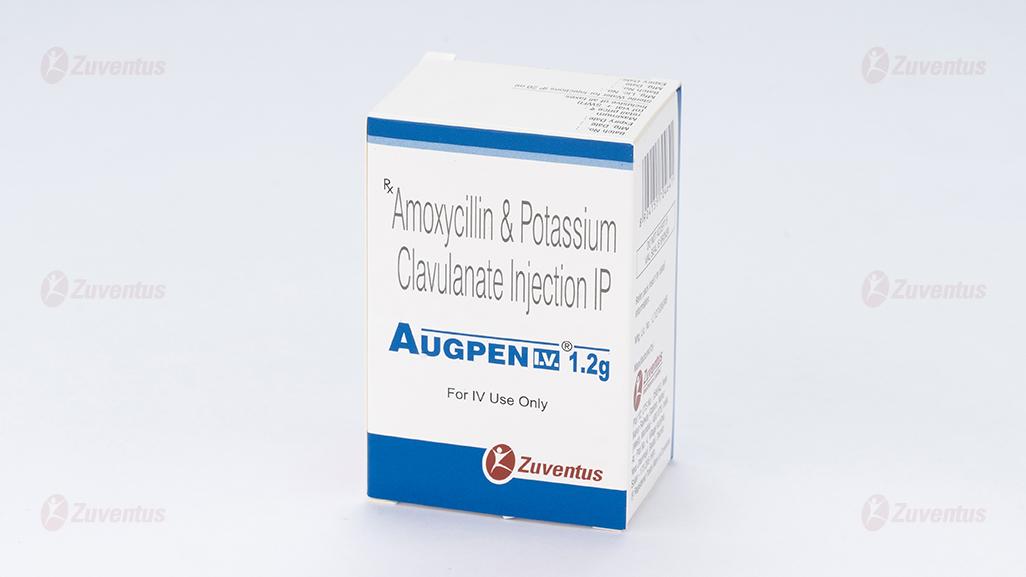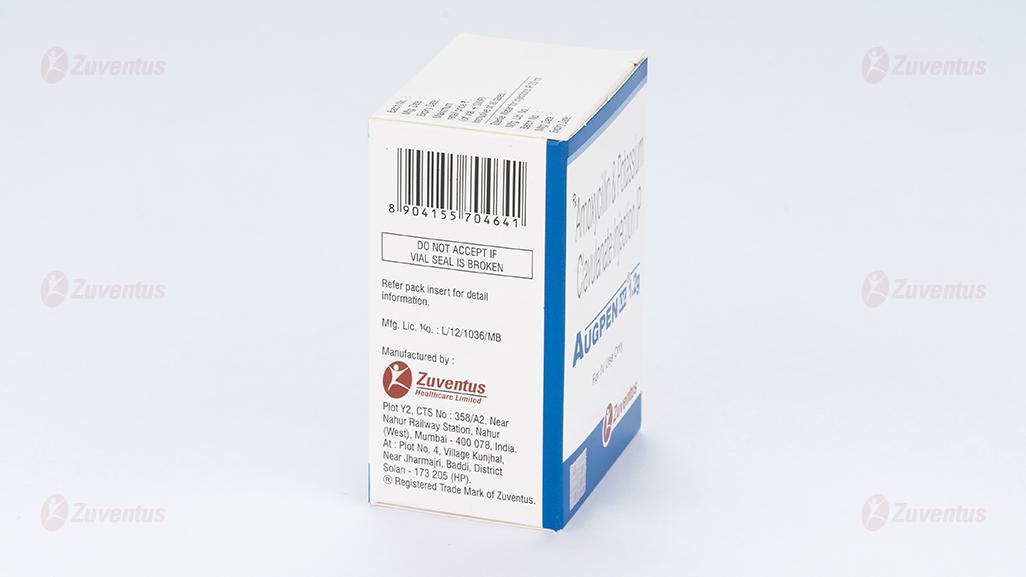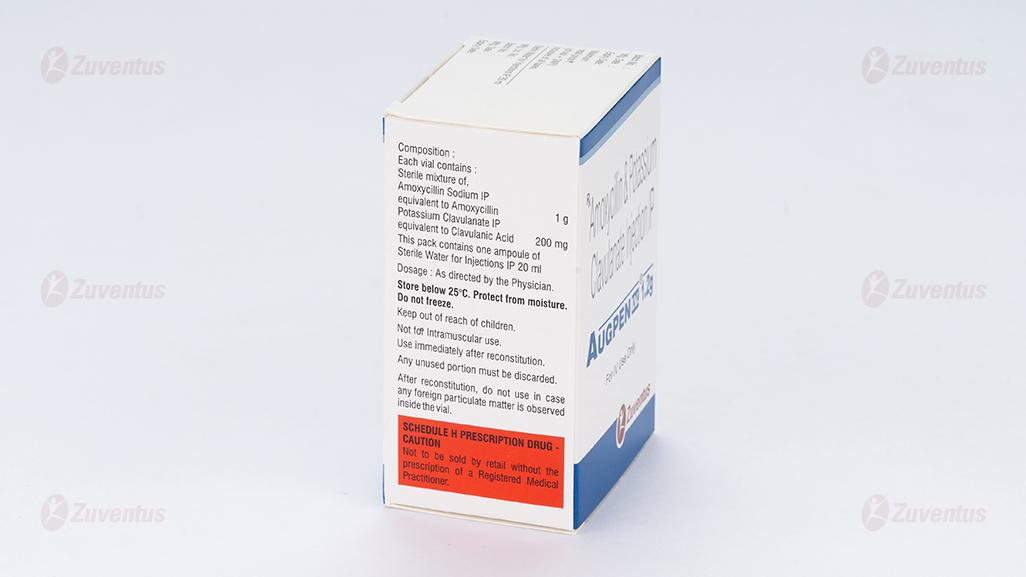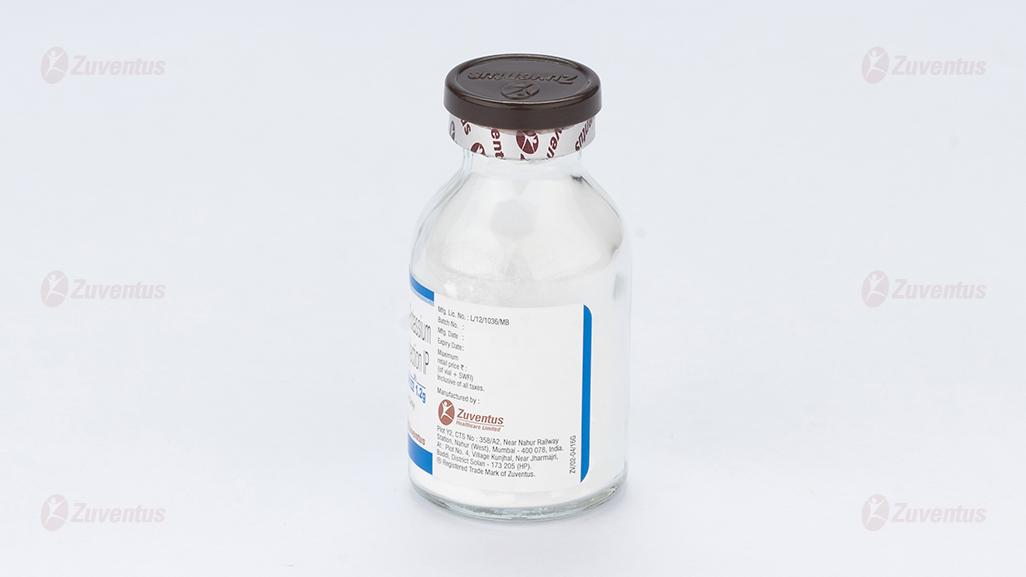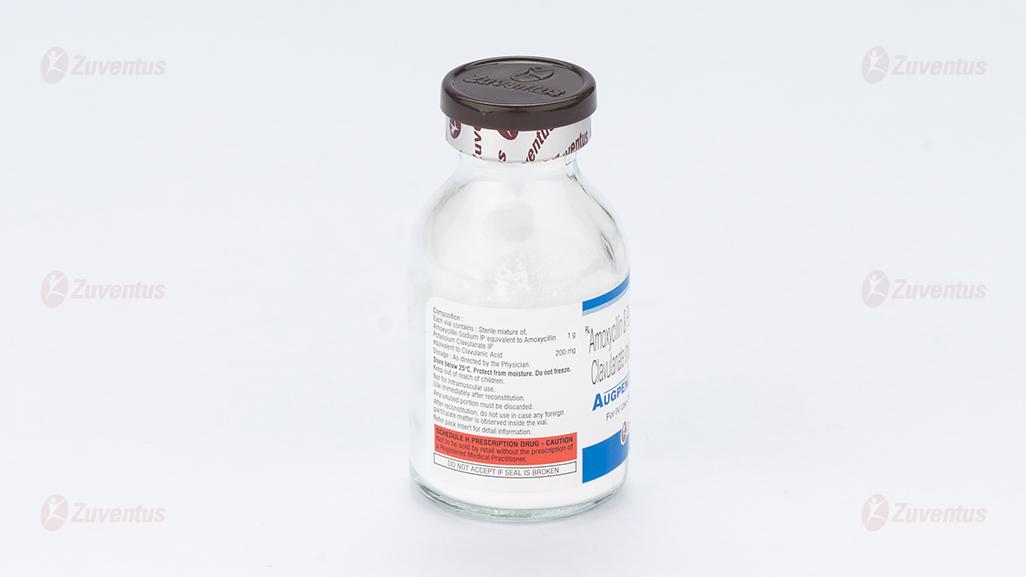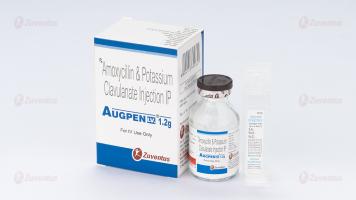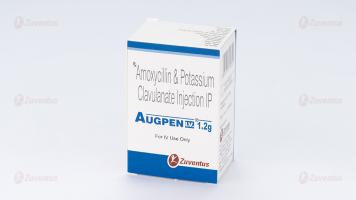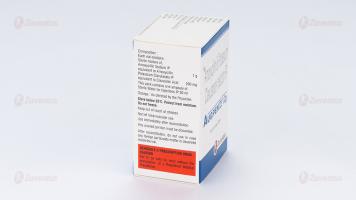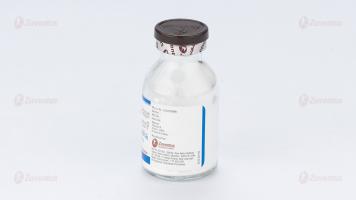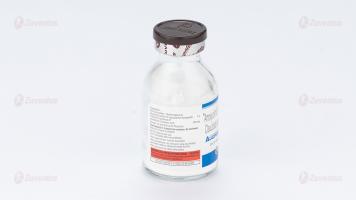Augpen IV 1.2g
Therapy Area
Anti Infective
1.0 Generic name
Amoxycillin and Potassium Clavulanate Injection IP
2.0 Qualitative and quantitative composition
Augpen I.V. 150 mg
Each vial contains :
Sterile mixture of,
Amoxycillin Sodium IP equivalent to Amoxycillin 125 mg
Potassium Clavulanate IP equivalent to Clavulanic Acid 25 mg
This pack contains one ampoule of Sterile Water for Injections IP 5 ml
Augpen I.V. 300 mg
Each vial contains :
Sterile mixture of,
Amoxycillin Sodium IP equivalent to Amoxycillin 250 mg
Potassium Clavulanate IP equivalent to Clavulanic Acid 50 mg
This pack contains one ampoule of Sterile Water for Injections IP 5 ml
Augpen I.V. 600 mg
Each vial contains :
Sterile mixture of,
Amoxycillin Sodium IP equivalent to Amoxycillin 500 mg
Potassium Clavulanate IP equivalent to Clavulanic Acid 100 mg
This pack contains one ampoule of Sterile Water for Injections IP 10 ml
Augpen I.V. 1.2 g
Each vial contains :
Sterile mixture of,
Amoxycillin Sodium IP equivalent to Amoxycillin 1 g
Potassium Clavulanate IP equivalent to Clavulanic Acid 200 mg
This pack contains one ampoule of Sterile Water for Injections IP 20 ml
3.0 Dosage form and strength
Sterile powder for injection
4.0 Clinical particulars
4.1 Therapeutic indication
- Upper respiratory tract infections (including ENT) e.g. recurrent tonsillitis, sinusitis, otitis media
- Lower respiratory tract infections e.g. acute exacerbation of chronic bronchitis, lobar and bronchopneumonia.
- Genito-urinary tract infections e.g. cystitis, urethritis, pyelonephritis.
- Skin and soft tissue infections e.g. boils, abscesses, cellulitis, wound infections.
- Bone and joint infections e.g. osteomyelitis
- Other infections e.g. intra-abdominal sepsis
Augpen is also indicated for prophylaxis against infection which may be associated with major surgical procedures such as gastrointestinal, pelvic, head and neck, cardiac, renal, joint replacement and biliary tract
4.2 Posology and method of administration
| Adults and children over 12 years | Usually 1.2 g eight hourly. In more serious infections, increase frequency to six-hourly intervals. |
| Children 3 months-12 years | Usually 30 mg/kg* AUGPEN eight hourly. In more serious infections, increase frequency to six-hourly intervals |
| Children 0-3 months | 30 mg/kg* AUGPEN every 12 hours in premature infants and in full term infants during the perinatal period, increasing to eight hours thereafter |
* Each 30 mg AUGPEN contains 25 mg amoxycillin and 5 mg clavulanate.
Adult dosage for surgical prophylaxis
The usual dose is 1.2 g I.V. AUGPEN given at the induction of anaesthesia. Operations where there is a high risk of infection, e.g. colorectal surgery, may require three, and up to four, doses of 1.2 g I.V.
AUGPEN in a 24-hour period. These doses are usually given at 0, 8, 16 (and 24) hours. This regimen can be continued for several days if the procedure has a significantly increased risk of infection.
Clear clinical signs of infection at operation will require a normal course of intravenous or oral AUGPEN therapy post-operatively
Renal Impairment
Adults
| Mild impairment (creatinine clearance >30 ml/min) | Moderate impairment (creatinine clearance 10-30 ml/min) | Severe impairment (creatinine clearance <10 ml/min) |
| No change in dosage | 1.2 g IV stat. followed by 600 mg IV 12 hourly | 1.2 g IV stat, followed by 600 mg IV 24 hourly. Dialysis decreases serum concentrations of AUGPEN and an additional 600 mg IV dose may need to be given during dialysis and at the end of dialysis |
Children
Similar reductions in dosage should be made for children.
Hepatic Impairment
Dose with caution; monitor hepatic function at regular intervals.
PREPARATION AND ADMINISTRATION :
AUGPEN I.V. intravenous should be administered only by intravenous injections or by intermittent I.V. infusion.
150 mg vial : to reconstitute dissolve contents in 2.5 ml Sterile Water for Injections IP (final volume: 2.62 ml).
300 mg vial : to reconstitute dissolve contents in 5 ml Sterile Water for Injections IP (final volume: 5.25 ml).
600 mg vial : to reconstitute dissolve contents in 10 ml Sterile Water for Injections IP (final volume: 10.5 ml).
1.2 g vial : to reconstitute dissolve contents in 20 ml of Sterile Water for Injections IP (final volume: 20.9 ml).
A transient pink colouration may appear during reconstitution. Reconstituted solutions normally have a pale or straw colour. Intravenous Injection : Within 20 minutes of reconstituting AUGPEN I.V. intravenous the same should be injected slowly over 3 to 4 minutes. AUGPEN I.V. intravenous may be injected either directly into a vein or through an intravenous line.
Intravenous Infusion : AUGPEN I.V. intravenous may be infused in Water for Injection IP or sodium chloride intravenous injection IP (0.9% w/v). Add without delay 600 mg reconstituted solution to 50 ml infusion fluid or 1.2 g reconstituted solution to 100 ml infusion fluid (preferably using a mini-bag or in-line burette). Infuse over 30-40 minutes and complete within 4 hours of reconstitution.
4.3 Contraindications
Patients with a history of hypersensitivity to beta-lactams, e.g. penicillins and cephalosporins.
Patients with a previous history of AUGPEN-associated jaundice/hepatic dysfunction.
4.4 Special warnings and precautions for use
Before initiating therapy with AUGPEN, careful enquiry should be made concerning previous hypersensitivity reactions, cephalosporins, or other allergens. Serious and occasionally fatal hypersensitivity reactions (including anaphylactoid and severe cutaneous adverse reactions) have been reported in patients on penicillin therapy. These reactions are more likely to occur in individuals with a history of penicillin hypersensitivity. If an allergic reaction occurs, AUGPEN therapy must be discontinued and appropriate alternative therapy instituted. Serious anaphylactic reactions require immediate emergency treatment with adrenaline. Oxygen, intravenous (i.v.) steroids and airway management (including intubation) may also be required. Changes in liver function tests have been observed in some patients receiving AUGPEN. The clinical significance of these changes is uncertain but AUGPEN should be used with caution in patients with evidence of hepatic dysfunction. Cholestatic jaundice, which may be severe, but is usually reversible, has been reported rarely. Signs and symptoms may not become apparent for up to six weeks after treatment has ceased. In patients with renal impairment AUGPEN dosage should be adjusted as recommended in the Posology and Method of Administration section. AUGPEN should be avoided if infectious mononucleosis is suspected since the occurrence of a morbilliform rash has been associated with this condition following the use of amoxycillin. Prolonged use may also occasionally result in overgrowth of non-susceptible organisms. Pseudomembranous colitis has been reported with the use of antibiotics and may range in severity from mild to life-threatening. Therefore, it is important to consider its diagnosis in patients who develop diarrhoea during or after antibiotic use. If prolonged or significant diarrhoea occurs or the patient experiences abdominal cramps, treatment should be discontinued immediately and the patient investigated further. Abnormal prolongation of prothrombin time [increased International Normalized Ratio (INR)] has been reported rarely in patients receiving AUGPEN and oral anticoagulants. Appropriate monitoring should be undertaken when anticoagulants are prescribed concurrently. Adjustments in the dose of oral anticoagulants may be necessary to maintain the desired level of anticoagulation. If the parenteral administration of high doses is necessary, the sodium content must be taken into account in patients on a sodium restricted diet. In patients with reduced urine output crystalluria has been observed very rarely, predominantly with parenteral therapy. During administration of high doses of amoxycillin it is advisable to maintain adequate fluid intake and urinary output in order to reduce the possibility of amoxycillin crystalluria. The presence of clavulanic acid in AUGPEN may cause a non-specific binding of IgG and albumin by red cell membranes leading to a false positive Coombs test.
4.5 Drugs interactions
Concomitant use of probenecid is not recommended. Probenecid decreases the renal tubular secretion of amoxycillin. Concomitant use with AUGPEN may result in increased and prolonged blood levels of amoxycillin but not of clavulanate. Concomitant use of allopurinol during treatment with amoxycillin can increase the likelihood of allergic skin reactions. There are no data on the concomitant use of AUGPEN and allopurinol. In common with other antibiotics, AUGPEN may affect the gut flora, leading to lower oestrogen reabsorption and reduced efficacy of combined oral contraceptives. The presence of clavulanic acid in AUGPEN may cause a non-specific binding of IgG and albumin by red cell membranes leading to a false positive Coombs test. In the literature there are rare cases of increased international normalised ratio in patients maintained on acenocoumarol or warfarin and prescribed a course of amoxycillin. If coadministration is necessary, the prothrombin time or international normalised ratio should be carefully monitored with the addition or withdrawal of AUGPEN. In patients receiving mycophenolate mofetil, reduction in pre-dose concentration of the active metabolite mycophenolic acid of approximately 50% has been reported following commencement of oral amoxicillin plus clavulanic acid. The change in pre-dose level may not accurately represent changes in overall MPA exposure.
4.6 Use in special populations
Pregnancy
Reproduction studies in animals (mice and rats) with orally and parenterally administered AUGPEN have shown no teratogenic effects. In a single study in women with preterm, premature rupture of the foetal membrane (pPROM), it was reported that prophylactic treatment with AUGPEN may be associated with an increased risk of necrotising enterocolitis in neonates. As with all medicines, use should be avoided in pregnancy, especially during the first trimester, unless considered essential by the physician.
Lactation
AUGPEN may be administered during the period of lactation. With the exception of the risk of sensitisation, associated with the excretion of trace quantities in breast milk, there are no detrimental effects for the infant.
4.7 Effects on ability to drive and use machines
Adverse effects on the ability to drive or operate machinery have not been observed
4.8 Undesirable effects
Infections and infestations
Common : Mucocutaneous candidiasis
Blood and lymphatic system disorders
Rare : Reversible leucopenia (including neutropenia) and thrombocytopenia
Very rare : Reversible agranulocytosis and haemolytic anaemia. Prolongation of bleeding time and prothrombin time
Immune system disorders
Very rare : Angioneurotic oedema, anaphylaxis, serum sickness-like syndrome, hypersensitivity vasculitis
Nervous system disorders
Uncommon : Dizziness, headache
Very rare : Aseptic meningitis, convulsions. Convulsions may occur in patients with impaired renal function or in those receiving high doses.
Vascular disorders
Rare : Thrombophlebitis at the site of injection
Gastrointestinal disorders
Common : Diarrhoea
Uncommon : Nausea, vomiting, indigestion
Very rare : Antibiotic-associated colitis (including pseudomembranous colitis and haemorrhagic colitis) are less likely to occur after parenteral administration.
Hepatobiliary disorders
Uncommon : A moderate rise in AST and/or ALT has been noted in patients treated with beta-lactam class antibiotics, but the significance of these findings is unknown. Very rare : Hepatitis and cholestatic jaundice. These events have been noted with other penicillins and cephalosporins. Hepatic events have been reported predominantly in males and elderly patients and may be associated with prolonged treatment. Signs and symptoms usually occur during or shortly after treatment but in some cases may not become apparent until several weeks after treatment has ceased. These are usually reversible. Hepatic events may be severe and in extremely rare circumstances, deaths have been reported. These have almost always occurred in patients with serious underlying disease or taking concomitant medications known to have the potential for hepatic effects.
Skin and subcutaneous tissue disorders
Uncommon : Skin rash, pruritus, urticaria
Rare : Erythema multiforme
Very rare : Stevens-Johnson syndrome, toxic epidermal necrolysis, bullous exfoliative-dermatitis, acute generalised exanthemous pustulosis (AGEP), drug reaction with eosinophilia and systemic symptoms (DRESS) If any hypersensitivity dermatitis reaction occurs, treatment should be discontinued.
Renal and urinary disorders
Very rare : Interstitial nephritis, crystalluria
Reporting of suspected adverse reactions
Reporting suspected adverse reactions after authorisation of the medicinal product is important. It allows continued monitoring of the benefit/risk balance of the medicinal product. Healthcare professionals are asked to report any suspected adverse reactions via email to : medico@zuventus.com
By reporting side effects, you can help provide more information on the safety of this medicine.
4.9 Overdose
Gastrointestinal symptoms and disturbance of the fluid and electrolyte balances may be evident. Gastrointestinal symptoms may be treated symptomatically with attention to the water electrolyte balance. Amoxycillin crystalluria, in some cases leading to renal failure, has been observed. AUGPEN can be removed from the circulation by haemodialysis. Amoxycillin has been reported to precipitate in bladder catheters after intravenous administration of large doses. A regular check of patency should be maintained.
5.0 Pharmacological properties
5.1 Mechanism of action
Amoxycillin is a semisynthetic antibiotic with a broad spectrum of antibacterial activity against many grampositive and gram-negative micro-organisms. Amoxycillin is, however, susceptible to degradation by betalactamases and therefore the spectrum of activity of amoxycillin alone does not include organisms which produce these enzymes. Clavulanic acid is a beta-lactam, structurally related to the penicillins, which possesses the ability to inactivate a wide range of beta-lactamase enzymes commonly found in microorganisms resistant to penicillins and cephalosporins. In particular, it has good activity against the clinically important plasmid mediated betalactamases frequently responsible for transferred drug resistance. It is generally less effective against chromosomally-mediated type 1 beta-lactamases. The presence of clavulanic acid in amoxycillin-clavulanate formulations protects amoxycillin from degradation by beta-lactamase enzymes and effectively extends the antibacterial spectrum of amoxycillin to include many bacteria normally resistant to amoxycillin and other penicillins and cephalosporins. Thus amoxycillin-clavulanate possesses the distinctive properties of a broad spectrum antibiotic and a betalactamase inhibitor.
5.2 Pharmacodynamic properties
The prevalence of resistance may vary geographically and with time for selected species, and local information on resistance is desirable, particularly when treating severe infections. As necessary, expert advice should be sought when the local prevalence of resistance is such that the utility of the agent in at least some types of infections is questionable.


5.3 Pharmacokinetic properties
The pharmacokinetics of the two components of AUGPEN are closely matched. Both clavulanate and amoxycillin have low levels of serum binding; about 70% remains free in the serum. Doubling the dosage of AUGPEN approximately doubles the serum levels achieved.
6.0 Nonclinical properties
6.1 Animal toxicology or pharmacology
No known animal toxicology data
7.0 Description
AUGPEN (beta-lactam antibacterial penicillin coformulated with a beta- lactamase inhibitor) is an antibiotic agent with a notably broad spectrum of activity against the commonly occurring bacterial pathogens in general practice and hospital. The beta-lactamase inhibitory action of clavulanate extends the spectrum of amoxycillin to embrace a wider range of organisms, including many resistant to other beta-lactam antibiotics.
8.0 Pharmaceutical particulars
8.1 Incompatibilities
Not applicable
8.2 Shelf-life
Refer on the pack
8.3 Packaging information
Augpen I.V. 150 mg : A vial of 150 mg with SWFI IP 5 ml.
Augpen I.V. 600 mg : A vial of 600 mg with SWFI IP 10 ml.
Augpen I.V. 300 mg : A vial of 300 mg with SWFI IP 5 ml
Augpen I.V. 1.2 g : A vial of 1.2 g with SWFI IP 20 ml.
8.4 Storage and handing instructions
Store below 25°C. Protect from moisture. Do not freeze.
Keep out of reach of children. After reconstitution, do not use in case any foreign particulate matter is observed inside the vial

Reconstituted solutions not be frozen.
For storage at 5°C, the reconstituted solution is added to pre-refrigerated infusion bags which can be stored for up to 8 hours. Thereafter, the infusion should be administered immediately after reaching room temperature. AUGPEN I.V. intravenous should not be mixed with blood products, other proteinaceous fluids such as protein hydrolysates or with Intravenous lipid emulsions. If AUGPEN I.V. intravenous is prescribed concurrently with an aminoglycoside the antibiotics should not be mixed in the same syringe, Intravenous fluid container or I.V. set because loss of aminoglycoside activity can occur under these conditions.
9.0 Patient counselling information
Talk to your doctor or pharmacist or nurse before having Augpen if you:
- have glandular fever
- are being treated for liver or kidney problems
- are not passing water regularly.
If you are not sure if any of the above apply to you, talk to your doctor, pharmacist or nurse before taking Augpen. In some cases, your doctor may investigate the type of bacteria that is causing your infection. Depending on the results, you may be given a different strength of Augpen or a different medicine.
Conditions you need to look out for
Augpen can make some existing conditions worse, or cause serious side effects. These include allergic reactions, convulsions (fits) and inflammation of the large intestine. You must look out for certain symptoms while you are taking Augpen, to reduce the risk of any problems.
Blood and urine tests
If you are having blood tests (such as red blood cell status tests or liver function tests) or urine tests (for glucose), let the doctor or nurse know that you are taking Augpen. This is because Augpen can affect the results of these types of tests.
Other medicines and Augpen
- Tell your doctor, pharmacist or nurse if you are using, have recently used or might use any other medicines.
- If you are taking allopurinol (used for gout) with Augpen, it may be more likely that you will have an allergic skin reaction.
- If you are taking probenecid (used for gout), your doctor may decide to adjust your dose of Augpen.
- If medicines to help stop blood clots (such as warfarin) are taken with Augpen then extra blood tests may be needed.
- Augpen can affect how methotrexate (a medicine used to treat cancer or rheumatic diseases) works.
- Augpen can affect how mycophenolate mofetil (a medicine used to prevent the rejection of transplanted organs) works.
12.0 Date of revision
18 July 2022
About leaflet
Read all of this leaflet carefully before you start using this medicine because it contains important information for you.
- Keep this leaflet. You may need to read it again.
- If you have any further questions, ask your doctor, pharmacist or nurse.
- If you get any side effects, talk to your doctor, pharmacist or nurse. This includes any possible side effects not listed in this leaflet.
What is in this leaflet
- What Augpen is and what it is used for
- What you need to know before you have Augpen
- How Augpen is given
- Possible side effects
- How to store Augpen
- Contents of the pack and other information
1. What Augpen is and what it is used for
Augpen is an antibiotic and works by killing bacteria that cause infections. It contains two different medicines called Amoxycillin and clavulanic acid. Amoxycillin belongs to a group of medicines called “penicillins” that can sometimes be stopped from working (made inactive). The other active component (clavulanic acid) stops this from happening.
Augpen is used in adults and children to treat the following infections:
- severe ear, nose and throat infections
- respiratory tract infections
- urinary tract infections
- skin and soft tissue infections including dental infections
- bone and joint infections
- intra-abdominal infections
- genital organ infections in women.
Augpen is used in adults and children to prevent infections associated with major surgical procedures.
2. What you need to know before you have Augpen
You should not have Augpen:
- if you are allergic to Amoxycillin, clavulanic acid, penicillin or any of the other ingredients of this medicine.
- if you have ever had a severe allergic reaction to any other antibiotic. This can include a skin rash or swelling of the face or throat.
- if you have ever had liver problems or jaundice (yellowing of the skin) when taking an antibiotic.
Do not take Augpen if any of the above apply to you. If you are not sure, talk to your doctor, pharmacist or nurse before having Augpen.
Warnings and Precautions
Talk to your doctor, pharmacist or nurse before having Augpen if you:
- have glandular fever
- are being treated for liver or kidney problems
- are not passing water regularly.
If you are not sure if any of the above apply to you, talk to your doctor, pharmacist or nurse before taking Augpen.
In some cases, your doctor may investigate the type of bacteria that is causing your infection.
Depending on the results, you may be given a different strength of Augpen or a different medicine.
Conditions you need to look out for
Augpen can make some existing conditions worse, or cause serious side effects. These include allergic reactions, convulsions (fits) and inflammation of the large intestine. You must look out for certain symptoms while you are taking Augpen, to reduce the risk of any problems.
Blood and urine tests
If you are having blood tests (such as red blood cell status tests or liver function tests) or urine tests (for glucose), let the doctor or nurse know that you are taking Augpen. This is because Augpen can affect the results of these types of tests.
Other medicines and Augpen
Tell your doctor, pharmacist or nurse if you are using, have recently used or might use any other medicines.
- If you are taking allopurinol (used for gout) with Augpen, it may be more likely that you will have an allergic skin reaction.
- If you are taking probenecid (used for gout), your doctor may decide to adjust your dose of Augpen. If medicines to help stop blood clots (such as warfarin) are taken with Augpen then extra blood tests may be needed.
- Augpen can affect how methotrexate (a medicine used to treat cancer or rheumatic diseases) works.
- Augpen can affect how mycophenolate mofetil (a medicine used to prevent the rejection of transplanted organs) works.
Pregnancy, breast-feeding and fertility
If you are pregnant or breast-feeding, think you may be pregnant or are planning to have a baby, ask your doctor, pharmacist or nurse for advice before taking this medicine.
Driving and using machines
Augpen can have side effects and the symptoms may make you unfit to drive. Do not drive or operate machinery unless you are feeling well.
3. How Augpen is given
|
Adults and children over 12 years |
Usually 1.2 g eight hourly. In more serious infections, increase frequency to six-hourly intervals. |
|
Children 3 months-12 years |
Usually 30 mg/kg* AUGPEN eight hourly. In more serious infections, increase frequency to six-hourly intervals |
|
Children 0-3 months |
30 mg/kg* AUGPEN every 12 hours in premature infants and in full term infants during the perinatal period, increasing to eight hours thereafter. |
* Each 30 mg AUGPEN contains 25 mg amoxycillin and 5 mg clavulanate.
Adult dosage for surgical prophylaxis
The usual dose is 1.2 g I.V. AUGPEN given at the induction of anaesthesia. Operations where there is a high risk of infection, e.g. colorectal surgery, may require three, and up to four, doses of 1.2 g I.V. AUGPEN in a 24-hour period. These doses are usually given at 0, 8, 16 (and 24) hours. This regimen can be continued for several days if the procedure has a significantly increased risk of infection. Clear clinical signs of infection at operation will require a normal course of intravenous or oral AUGPEN therapy post-operatively.
Patients with kidney and liver problems
- If you have kidney problems you may be given a different dose. A different strength or a different medicine may be chosen by your doctor.
- If you have liver problems your doctor will keep a close check on you and you may have more regular liver function tests.
How Augpen will be given to you
- Augpen will be given as an intravenous injection or by intermittent I.V. infusion.
- Make sure you drink plenty of fluids while having Augpen.
- You will not normally be given Augpen for longer than 2 weeks without the doctor reviewing your treatment.
If more Augpen is given to you than recommended
It is unlikely you will be given too much, but if you think you have been given too much Augpen, tell your doctor, pharmacist or nurse immediately. Signs may be an upset stomach (feeling sick, being sick or diarrhoea) or convulsions. If you have any further questions about how this medicine is given, ask your doctor, pharmacist or nurse.
4. Possible side effects
Like all medicines, this medicine can cause side effects, although not everybody gets them. The side effects below may happen with this medicine.
Conditions you need to look out for
Allergic reactions
- skin rash
- inflammation of blood vessels (vasculitis) which may be visible as red or purple raised spots on the skin, but can affect other parts of the body
- fever, joint pain, swollen glands in the neck, armpit or groin
- swelling, sometimes of the face or throat (angioedema), causing difficulty in breathing
- collapse.
Contact a doctor immediately if you get any of these symptoms. Stop taking Augpen.
Inflammation of large intestine
Inflammation of the large intestine, causing watery diarrhoea usually with blood and mucus, stomach pain and/or fever. Contact your doctor as soon as possible for advice if you get these symptoms.
Common side effects
These may affect up to 1 in 10 people
- thrush (candida - a yeast infection of the vagina, mouth or skin folds)
- diarrhoea
Uncommon side effects
These may affect up to 1 in 100 people
- skin rash, itching
- raised itchy rash (hives)
- feeling sick (nausea), especially when taking high doses
if affected take Augpen before food
- vomiting
- indigestion
- dizziness
- headache.
Uncommon side effects that may show up in your blood tests:
- increase in some substances (enzymes) produced by the liver.
Rare side effects
These may affect up to 1 in 1000 people skin rash, which may blister, and looks like small targets (central dark spots surrounded by a paler area, with a dark ring around the edge – erythema multiforme)
if you notice any of these symptoms contact a doctor urgently.
- swelling and redness along a vein which is extremely tender when touched
Rare side effects that may show up in your blood tests:
- low number of cells involved in blood clotting
- low number of white blood cells.
Frequency not known
Frequency cannot be estimated from available data.
- Allergic reactions (see above)
- Inflammation of the large intestine (see above)
- Inflammation of the protective membrane surrounding the brain (aseptic meningitis)
- Serious skin reactions:
a widespread rash with blisters and peeling skin, particularly around the mouth, nose, eyes and genitals (Stevens-Johnson syndrome), and a more severe form, causing extensive peeling of the skin (more than 30% of the body surface – toxic epidermal necrolysis)
widespread red skin rash with small pus-containing blisters (bullous exfoliative dermatitis)
a red, scaly rash with bumps under the skin and blisters (exanthemous pustulosis). oflu-like symptoms with a rash, fever, swollen glands, and abnormal blood test results (including increased white blood cells (eosinophilia) and liver enzymes) (Drug Reaction with Eosinophilia and Systemic Symptoms (DRESS)).
Contact a doctor immediately if you get any of these symptoms.
- inflammation of the liver (hepatitis)
- jaundice, caused by increases in the blood of bilirubin (a substance produced in the liver) which
- may make your skin and whites of the eyes appear yellow
- inflammation of tubes in the kidney
- blood takes longer to clot
- convulsions (in people taking high doses of Augpen or who have kidney problems).
Side effects that may show up in your blood or urine tests:
- severe reduction in the number of white blood cells
- low number of red blood cells (haemolytic anaemia)
- crystals in urine.
5. How to store Augpen
The expiry date and storage instructions stated on the label are for the doctor, nurse or pharmacist’s information. The doctor, pharmacist or nurse will make up your medicine.
Keep this medicine out of the sight and reach of children.
Do not use this medicine after the expiry date (EXP) shown on the carton. The expiry date refers to the last day of that month.
Do not store above 25°C.
Do not throw away any medicines via wastewater or household waste. Ask your pharmacist how to throw away medicines you no longer use. These measures will help protect the environment.
6. Contents of the pack and other information
What Augpen contains
Augpen I.V. 150 mg
Each vial contains: Sterile mixture of
Amoxycillin Sodium IP equivalent to Amoxycillin 125 mg
Potassium Clavulanate IP equivalent to Clavulanic Acid 25 mg
This pack contains one ampoule of Sterile Water for Injections IP 5 ml
Augpen I.V. 300 mg
Each vial contains: Sterile mixture of
Amoxycillin Sodium IP equivalent to Amoxycillin 250 mg
Potassium Clavulanate IP equivalent to Clavulanic Acid 50 mg
This pack contains one ampoule of Sterile Water for Injections IP 5 ml
Augpen I.V. 600 mg
Each vial contains: Sterile mixture of
Amoxycillin Sodium IP equivalent to Amoxycillin 500 mg
Potassium Clavulanate IP equivalent to Clavulanic Acid 100 mg
This pack contains one ampoule of Sterile Water for Injections IP 10 ml
Augpen I.V. 1.2 g
Each vial contains: Sterile mixture of
Amoxycillin Sodium IP equivalent to Amoxycillin 1 gm
Potassium Clavulanate IP equivalent to Clavulanic Acid 200 mg
This pack contains one ampoule of Sterile Water for Injections IP 20 ml
Packaging information
Augpen I.V. 150 mg : A vial of 150 mg with SWFI IP 5 ml.
Augpen I.V. 300 mg : A vial of 300 mg with SWFI IP 5 ml.
Augpen I.V. 600 mg : A vial of 600 mg with SWFI IP 10 ml.
Augpen I.V. 1.2 g : A vial of 1.2 g with SWFI IP 20 ml.


